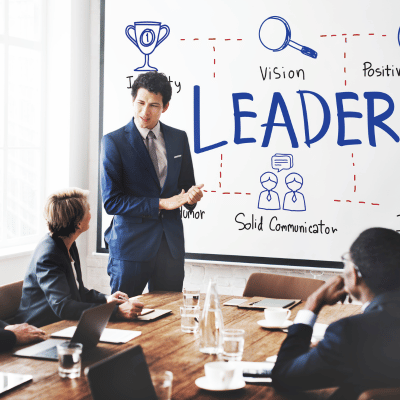In an era where business dynamics are constantly evolving, the importance of effective leadership has escalated. Leadership development programs stand at the forefront of this evolution, equipping aspiring leaders with the skills and insights necessary for success in the future business landscape.
This comprehensive exploration will delve into what these programs entail and the diverse forms they take, highlighting their significance in shaping tomorrow’s leaders.
What Is a Business Leadership Development Program?
A business leadership development program encompasses a structured approach to enhance individuals’ leadership capabilities within an organization. These programs are meticulously designed to build the necessary managerial and strategic skills and foster critical soft skills such as emotional intelligence, resilience, and visionary thinking, which are vital in today’s fast-paced business environment.
Commitment to Developing Future Leaders
How can a leader commit to developing future leaders? This question lies at the heart of these programs. It’s about creating a culture where seasoned leaders mentor and guide emerging talent, ensuring a legacy of strong leadership continues. It’s a commitment that involves time, resources, and a genuine desire to see others grow and succeed.
Future Leadership Program Essentials
A well-rounded future leadership program focuses on practical experience as much as theoretical learning. It integrates real-world business challenges, leadership projects, and networking opportunities, providing a comprehensive platform for growth and development.
Types Of Leadership Development Programs
Leadership development programs come in various formats, each designed to address specific organizational goals and employee development needs.
Traditional In-House Training Programs
Rooted in organizational culture and values, traditional in-house programs typically involve interactive workshops, leadership seminars, and mentorship initiatives. These programs are often led by experienced executives and are tailored to the unique dynamics and goals of the organization.
Leadership Training Programs for Employees
Organizations increasingly recognize that leadership skills are essential at all levels. Hence, employee leadership training programs are designed to imbue a broad base of staff with leadership competencies. These programs range from basic leadership principles for new employees to advanced strategy and management skills for mid-level professionals.
Online and Hybrid Learning Models
The digital transformation has given rise to online and hybrid learning models. These innovative programs offer flexibility and accessibility, allowing employees across various geographical locations to participate and benefit. They utilize a blend of digital coursework, virtual workshops, and interactive online sessions to create a dynamic learning environment.
Rotational and Cross-Functional Programs
Rotational development programs offer a unique perspective, allowing participants to experience different roles and departments. This broad exposure is invaluable in developing versatile leaders who understand various aspects of the business and can adapt to diverse operational challenges.
Specialized Initiatives for High-Potential Employees
Targeted at the crème de la crème, these specialized programs identify and nurture high-potential employees. They are often a mix of rigorous training, leadership projects, and executive mentorship, all designed to prepare individuals for senior leadership roles.
What Are The 3 Components of The Leadership Development Program?
Leadership development programs, though varied in their execution, generally comprise three critical components that ensure their effectiveness and success.
Comprehensive Curriculum
The foundation of any leadership program is a comprehensive curriculum that covers a broad range of topics. This includes strategic planning, decision-making, team management, and effective communication. The curriculum is designed to challenge and stimulate the intellectual and emotional growth of the participants, preparing them for the complexities of leadership roles.
Practical Application and Experiential Learning
Theory alone is not sufficient to mold effective leaders. Therefore, a vital component of these programs is the opportunity for practical application. This may involve real-life projects, simulations, and case studies, allowing participants to apply their learning in realistic scenarios. Experiential learning helps in developing critical thinking, problem-solving skills, and the ability to navigate real-world business challenges.
Mentorship and Networking Opportunities
Mentorship from experienced leaders and networking opportunities form the third crucial component.
These elements provide participants with valuable insights, advice, and the chance to build professional relationships. Mentorship and networking can significantly influence personal growth and career advancement, offering guidance and support beyond the program’s duration.
Collectively, these components ensure that leadership development programs are well-rounded, impactful, and capable of nurturing future business leaders.
Best Leadership Development Programs In 2024
As we look ahead to 2024, several leadership development programs stand out for their innovation, comprehensiveness, and effectiveness.
Global Leadership Excellence Program
This program is renowned for its international focus and diverse participant group. It offers a unique blend of global business insights, leadership skill development, and cross-cultural experiences, making it ideal for aspiring global leaders.
High-Potential Leadership Accelerator
Targeting high-potential individuals within organizations, this program focuses on rapid development of leadership skills through intensive training, coaching, and challenging assignments. It’s designed to prepare participants for executive roles within a short timeframe.
Digital Leadership Initiative
Recognizing the increasing importance of digital transformation, this program specializes in equipping leaders with the skills to lead in a digital-first world. It covers areas like digital strategy, innovation management, and leading remote teams.
Conclusion
Leadership development programs are essential in preparing the next generation of business leaders. The most effective programs are those that blend a comprehensive curriculum, practical application, and opportunities for mentorship and networking.
As we move into 2024, the best programs are those that not only address traditional leadership skills but also cater to the evolving demands of the global business environment, including digital transformation and global leadership.
Organizations that invest in these programs demonstrate a commitment to nurturing talent and ensuring long-term success. For individuals, participating in these programs can be a transformative experience, equipping them with the skills, confidence, and network needed to excel in leadership roles.
The future of business leadership looks promising, with these development programs playing a pivotal role in shaping competent, innovative, and adaptive leaders who are ready to tackle the challenges and opportunities of the ever-changing business world.




